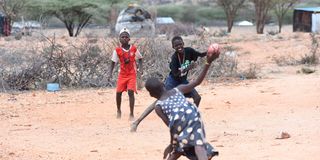School-going children should be left to enjoy their vacation

Children playing at Katukuri village in Turkana County on April 15, 2021.
In the spirit of the Competency-Based Curriculum (CBC), let us not transfer academic work to our homes during the school holiday break. Children should be left to enjoy the vacation.
I have raised concern over the heavy workload given to children in the name of holiday assignments in the past. This is mentally draining and a hindrance to the free growth and development of children. Schools have turned children into academic robots.
Holistic human development must focus on all aspects of a being - physical, mental, social, moral, emotional, aesthetic, and linguistic development. Most of these cannot be developed in the four walls of a classroom.
It is the second time that children have a long holiday since the re-opening of schools after the long closure occasioned by Covid19. For the last two years children have had a marathon of academic work with short holiday breaks that last only a week.
In addition, there have been limited co-curricular activities due to the fear of Corona virus infections and pressure to recover ‘lost’ time.
This is despite educationists and psychologists warning that such a crash programme is not healthy for children, their parents or teachers. This has led to the rise of psychosocial issues such as stress, depression, and anti-social behaviour like homosexuality and lesbianism.
Media has reported an increase in suicide cases among teachers, parents and students. Assault, bullying and even homicide have increased amongst learners.
Psychoanalytic research and health experts show that mental illness and antisocial behaviour are related to deprivation of two essential functions of the body - natural sleep and play.
When exposed to an optimal environment without inhibition, human beings of all ages will look for leisure activities to unwind and release accumulated pressure or sleep when tired.
The ministry of Education stipulates a structured learning day with breaks in between the activities from Monday to Friday. Schools ought to organise co-curricular activities such as games and sports, drama, music, clubs and societies after classes.
Unfortunately in the rushed school programme children have had limited breaks and have instead been literally in class being ‘taught’. It is in the public domain that school administrators do not adhere to stipulated policies thus denying children their rightful time for physical education and leisure.
The school holiday break is a great relief for children. This is the time they can unwind by sleeping and playing.
Parents and/or caregivers may have noticed that their children tend to sleep more soon after schools close and whenever they are awake they spontaneously turn to play and other social activities other than books.
This serves as compensation for sleep deprivation and limited play at school. Deprivation of this essentials leads to deterioration of the neurons which serve different functions. During sleep the brain eliminates waste.
Research on mice showed that some of the proteins related to Alzheimer’s disease were eliminated during sleep.
The brain lends repair unto itself during sleep. Likewise, research in social psychology shows that play leads to healthy social interactions, and non-formal and informal learning. It is during play that children practice what is learnt formally in school.
Before the 8-4-4 system of education was introduced in Kenya, children rarely carried home their school instruction resources. More often than not, ‘home-work’ was completed within the school.
As years went by, children were turned into ‘book worms’, both in school and at home, thanks to the examination-oriented 8-4-4 curriculum. It was sad to see the huge backpacks of books that children had to carry leading to back problems for some and with many developing a detest for school life. Ultimately, this led to the decline of a reading culture as well as to mental stress.
Children should be allowed to sleep to their satisfaction during school holidays and also be provided with a conducive environment for play. This will refresh their brain and renew their physical energy. Social and moral development will be maximised. Children will inadvertently practise language skills and etiquette such as turn taking as they set rules and use them during play. They acquire essential life skills and living values.
Parents and caregivers: your role is to provide safe havens and realistic rules and regulations. Let children know the consequences of any anti-social behaviour and the likely long term effect of the same in their lives.
Avoid unnecessary confinement and too much academic pressure on the child during school vacations. Study time, if any, should start at 9am and end by lunch time. We cannot force a culture of reading in children through the approach of tedious academic assignments. Leisure reading should instead be advocated for.
Dr Wanjohi is a consultant in education, currently a lecturer at Kenyatta University. [email protected]





